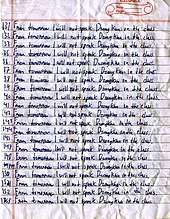Writing lines
Writing lines is a form of punishment handed out to misbehaving students by people in a position of authority at schools. It is a long-standing form of school discipline and is frequently satirised in popular culture.

Description
Writing lines involves copying a sentence on to a piece of standard paper or a chalkboard as many times as the punishment-giver deems necessary. The actual sentence to be copied varies but usually bears some relation to the reason the lines are being given in the first place, e.g., "I must not talk in class".[1]
The use of writing as punishment has been suggested to conflict with the pedagogical goal of encouraging students to enjoy writing.[2] Writing is often used as a way to leverage shame and humiliation for punishment.[3] However, particularly with young children, it may reduce disruptive behavior at least while they are in the process of writing, simply because of the focus required for them to make the body movements for writing.[4]
History
Writing lines is a long-standing form of school discipline, having survived even as other old punishments such as school corporal punishment and dunce hats fell out of favour in the 20th century.[2] In a 1985 study, over half of respondent teachers in an English speaking country indicated awareness of the use of writing to discipline students.[5] In 2019, a third-year secondary school student in Harbin, China, purchased a robot which automates handwriting for CN¥ 800 in order to complete a homework assignment which involved writing lines.[6]
In popular culture
Writing lines is frequently satirised in popular culture as "a symbol of futile, old-fashioned, one-size-fits-all schoolhouse discipline", as in the chalkboard gag seen at the beginning of many episodes of The Simpsons, where Bart Simpson writes lines on a chalkboard as a punishment.[1][7] Other appearances in fiction reflect the figurative belief that "writing has the power to work back on the writer", as Franz Kafka's 1919 short story "In the Penal Colony" in which a punishment device inscribes lines onto the bodies of criminals with a sharpened writing implement until they bleed to death, or the 2003 book Harry Potter and the Order of the Phoenix in which Potter is forced to write lines with a magical quill which uses his blood as ink.[8] It has also been used in a satirical way in Life of Brian. Brian attempts to write "Romans go home" (in Latin) on a wall of the local Roman garrison, but is spotted by a Roman soldier who notes that he has made grammatical errors ("Romanes eunt domus", "People called the Romanes, they go, the house?"). Once he gets the grammar right, he is ordered to write the (correct) sentence ("Romani ite domum") all over the building for the rest of the night, resulting in his future "fame" when his graffiti is discovered by the population.
Notes
- Schaffner 2019, p. 14
- Schaffner 2019, p. 11
- Schaffner 2019, p. 5
- Dixon 2010, p. 84
- Hogan 1985, p. 41
- 李納德 (17 February 2019). "完美模仿筆迹?內地女生800人仔買「寫字機器人」 阿媽嬲爆砸爛". HK01 (in Chinese).
- Turner 2004, p. 71.
- Schaffner 2019, p. 15
References
| Wikimedia Commons has media related to Writing lines. |
- Dixon, Kerryn (2010). Literacies, Power, and the Schooled Body: Learning in Time and Space. Routledge. ISBN 9781136969751.CS1 maint: ref=harv (link)
- Hogan, Michael Phinney (1985). "Writing as Punishment". The English Journal. 74 (5): 40–42. doi:10.2307/817699. JSTOR 817699.CS1 maint: ref=harv (link)
- Schaffner, Spencer (2019). Writing as Punishment in Schools, Courts, and Everyday Life. University of Alabama Press. ISBN 9780817359553.CS1 maint: ref=harv (link)
- Turner, Chris (2004). Planet Simpson: How a Cartoon Masterpiece Documented an Era and Defined a Generation. Foreword by Douglas Coupland. (1st ed.). Toronto: Random House Canada. ISBN 978-0-679-31318-2. OCLC 55682258.CS1 maint: ref=harv (link)